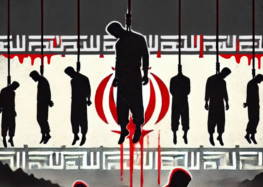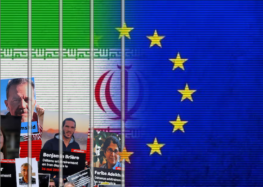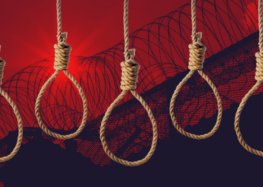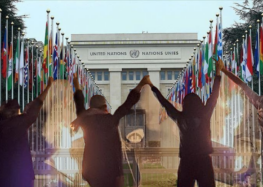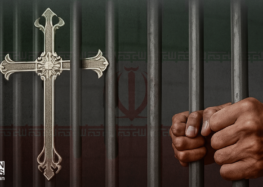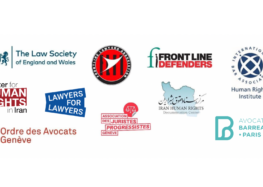Iran’s Secret Hangings: Mass Unannounced Executions in Mashhad’s Vakilabad Prison
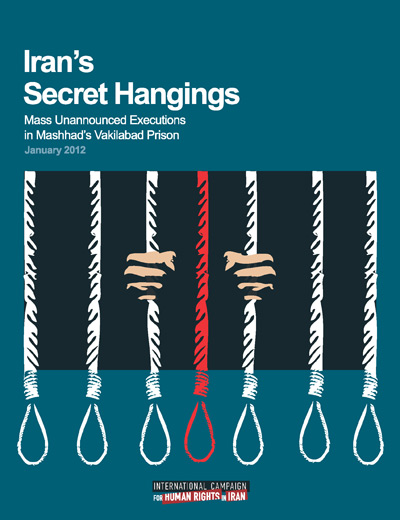 Since January 2010, the International Campaign for Human Rights in Iran has published dozens of reports of unannounced secret group executions at Vakilabad Prison in the northeast city of Mashhad. These executions were largely in violation of international human rights law and domestic procedures. Judicial authorities have continuously evaded questions about these executions and the names of those executed have never been officially announced.
Since January 2010, the International Campaign for Human Rights in Iran has published dozens of reports of unannounced secret group executions at Vakilabad Prison in the northeast city of Mashhad. These executions were largely in violation of international human rights law and domestic procedures. Judicial authorities have continuously evaded questions about these executions and the names of those executed have never been officially announced.
This briefing paper features the first list of victims of secret executions in Vakilabad and other execution statistics, as well as witness testimony and official accounts of the executions. This briefing paper also details the major characteristics and illegality of these executions.
_______________________
The Numbers of Secret Executions in Vakilabad
Inside Vakilabad: Trends and Violations in Secret Executions
Executions in Other Iranian Prisons
Table I: 101 Named Individuals Secretly Executed in Vakilabad Prison
Table II: Reported Secret Executions in Mashhad’s Vakilabad Prison
_______________________
Since January 2010, the International Campaign for Human Rights in Iran has published dozens of reports of unannounced secret group executions at Vakilabad Prison in the northeast city of Mashhad. These executions were largely in violation of international human rights law and domestic procedures. Judicial authorities have continuously evaded questions about these executions and the names of those executed have never been officially announced.
On 21 December 2011, Ayatollah Sadegh Amoli Larijani, head of the judiciary, said “I categorically deny any secret mass executions…All executions are announced to my office…if anyone has information about executions anywhere that have been secret and without knowledge of families, let us know and we will investigate it.”
Now, reliable sources close to government agencies associated with these executions have disclosed the names of one hundred and one of the people put to death in the past two years to the Campaign. The victims of secret executions at Vakilabad were largely charged with drug trafficking offenses, and their families and lawyers were absent at the time of their executions.
This briefing paper features the first list of victims of secret executions in Vakilabad and other execution statistics, as well as witness testimony and official accounts of the executions. This briefing paper also details the major characteristics and illegality of these executions.
The end of the report also offers evidence of secret executions in the prisons of Birjand, Ghazal Hessar in Karaj, Karoun Prison in Ahvaz, Taybad, Orumiyeh and Qom.
Local witnesses and human rights activists from Mashhad told the Campaign that from January 2010 until September 2011, authorities carried out secret group executions on 24 separate occasions in Vakilabad Prison, resulting in the deaths of over 365 people.[1] The prison administration and judiciary have never publicly announced these executions nor the names and identities of the victims. The prisoners executed were mostly charged with drug trafficking offenses.
In the wake of increasing reports by human rights groups about secret executions taking place in Iran, and the Iranian government’s abuse of the death penalty, the international community has become more concerned about the issue.
On 14 March 2011, United Nations Secretary General Ban Ki-Moon issued a report on the situation of human rights in Iran which partly corroborated the Campaign’s findings on secret group executions at Vakilabad. The report stated:
In July 2010, a large number of prisoners were reportedly executed at one time in Mashhad prison. When OHCHR staff sought further information from Iranian counterparts during a visit to Tehran in December 2010, they confirmed that 60 persons had been executed in Mashhad in pending cases mostly linked to drug trafficking.[2]
The secret killing spree has elicited other international concern and condemnation, and was cited as a rights violation in the October 2011 interim report by Special Rapporteur on the situation of human rights in Iran, Ahmad Shaheed.
According to international law, the death penalty is only available for “the most serious crimes.” Several authoritative bodies including the UN Human Rights Committee have made clear that drug offenses do not meet the “most serious crimes” standard. Therefore, Iran’s practice of executable offenses violates the government’s international obligations. As the UN’s Special Rapporteur on extrajudicial, summary or arbitrary executions, Christof Heyns, said about Iran’s use of the death penalty on 2 February 2011, “Such a practice is unacceptable. … Under international law, the death penalty is regarded as an extreme form of punishment which, if it is used at all, should only be imposed for the most serious crimes, after a fair trial.”[3]
The Numbers of Secret Executions in Vakilabad
The Campaign has documented 365 individuals who were secretly executed at Vakilabad since January 2010.
Iranian officials have by and large remained silent on the issue, withholding nearly all statistics and details of these executions. Nonetheless, credible sources from within the judicial department of Razavi Khorasan province as well as Vakilabad Prison have disclosed to the Campaign the identities of 101 victims of secret executions. These persons were executed en masse on five separate occasions between 9 June and 20 December 2010. Among the victims was one woman; all other named persons were men. Sixteen foreign nationals were also executed: fourteen from Afghanistan, one from Ghana, and one from Nigeria.
These names were obtained from the confidential documents of government agencies directly connected to implementing executions.
This list of 101 individuals and the total of 365 executions in Vakilabad only refer to the secret executions, and does not include other executions (see Tables I and II. Other executions that do not occur in secret are mostly related to retributive crimes such as homicide that are implemented in the presence of the victim’s family.
The executions are considered “secret” because they are implemented without the notification or presence of attorneys or family members, who only learn of the execution days after its occurrence. Even the prisoners themselves are not notified until a few hours before the implementation of the death sentence.
These executions are considered “unannounced” because judicial and government officials have not disclosed any information such as names or the numbers and dates of the executions. Effectively, the government does not take public responsibility for these executions.
Secret Executions Outside of Vakilabad
The Campaign has documented 471 secret executions since January 2010 in Vakilabad and other prisons throughout Iran. However, the true number is believed to be much higher as Iranian authorities have failed to offer transparent accounts of executions in Iran (see: Executions in Other Iranian Prisons).
Local witnesses report similar executions in Taybad Prison, Birjand Prison, Ghezel Hessar Prison in Karaj, Orumiyeh Prison, and Karoun Prison.
Since the International Campaign for Human Rights in Iran has not been able to confirm the above-mentioned information through correspondence with witnesses or reliable sources, the number of executions in these prisons will not be released. The Campaign will continue to search to obtain more information on this matter.
Inside Vakilabad: Trends and Violations in Secret Executions
Over the past two years, witnesses have come forward to speak out against the spree of mass executions in Vakilabad. These people include former prisoners, families of victims, prison personnel, individuals close to the criminal justice system and even some government officials. Some witnesses spoke anonymously while others testified openly.
The collective testimony paints a full picture of these death sentences, moving from trial to implementation. Sources describe the common attributes of secret executions at Vakilabad, including their mass and group nature, lack of fair trials, as well as conditions leading up to the actual execution.
The section below covers some of the common features described in interviews with credible witnesses to the Campaign.
Lack of Fair Trials and Drug Convictions
Some witnesses testified to the lack of due process in the trials and death sentences of victims of secret executions at Vakilabad. Trials were conducted in a hasty manner, often without legal or diplomatic representation, and nearly always for drug offenses.
One source told the Campaign that some of the trials lasted only a few minutes.
A local source who talked to several families and lawyers of executed persons in Mashhad told the Campaign:
Several branches of the Revolutionary Court of Mashhad, without observing fair judicial procedures or national laws, review several drug offense cases an hour.
In the majority of cases, [these convictions and] death sentences are based primarily on the reports of the Intelligence Office or information provided by the Revolutionary Guards, false information, or confessions by the prisoners attained under severe physical torture. This torture was usually implemented in the detention centers.
The vast majority of these death sentences issued by Mashhad’s Revolutionary Court are for prisoners with drug related offenses. The verdicts are reached during a brief court session, usually without the presence of the court-appointed lawyer.
Within just a few months the sentence gets approved and implemented.[4]
Several witnesses of Mashhad describe the issuance and confirmation of these trials as hasty and unjust and consider the judicial process of these cases unfair and inequitable. Earlier, on 18 August 2010, the nephew of one of the executed prisoners told the Campaign: “It took only two months from the time of the arrest to the implementation of his uncle’s sentence and he was not granted the right to a fair trial.”
The nephew added that, “discovering 300 grams of drugs in my uncle’s house was the basis for issuing his death sentence, despite his claim that the drugs belonged to someone else who had run away; in a rushed and illegal procedure the death sentence was issued and the truth or inaccuracy of his claim was never investigated.”[5]
Many of the Vakilabad victims were reportedly foreign nationals. Authorities allegedly failed to observe diplomatic protocol and inform the relevant embassies of these arrests, trials and death sentences. Thus, in almost all these cases, the defendants did not have access to diplomatic representation, as required by international law. This requirement, in part, is designed to ensure foreign governments can protect the due process rights of their citizens accused of crimes abroad. Moreover, according to the Campaign’s source, these individuals, as a result of their unfamiliarity with Persian, were unable to understand the judicial procedure or the questions asked of them by the court.
Nearly all sources from Mashhad, told the Campaign that the vast majority of executions were implemented for drug related crimes. However, under Iran’s international legal obligations, authorities are barred from executing individuals for drug offenses. Officials have thus refused to respond to international criticism that their pattern of execution violates human rights law with regards to capital punishment.
Mass Executions and Group Killings
Besides testifying to due process violations, other witnesses detailed the rate of executions and atmosphere of Vakilabad’s death row. These witnesses emphasized the mass and group nature of the executions.
Prominent religious scholar and political prisoner Ahmad Ghabel, who was first convicted on 20 December 2009 and imprisoned for 170 days, published an essay detailing the atrocities at Vakilabad Prison.
According to Ghabel, at least ten people were executed every two weeks during his time in Vakilabad. Ghabel describes his experience:
During my three months imprisonment, in ward 6/1 of Vakilabad Prison, according to the statistics provided by the prison’s officials and guards, more than fifty people were transferred to Ward 6/1 and shortly thereafter were executed. In just one instance thirty-one people were executed.
Why, if these executions were supposedly justified and legal from the point of view of officials, were they carried out in secret for sentences such as drug trafficking, retribution and rape? If they are not defensible then why are they implemented at all?
Why doesn’t the Islamic Penal Code heed the instructions of the Quran which say, ‘do not indulge in killing’? Isn’t the killing of several people in a month or a year excessive? Why is no one looking for a solution to this problem?
According to unofficial estimates there were hundreds of inmates on death row [in Vakilabad] in the short time I was there. I got to know many of these people personally.[6]
In a letter dated 10 August 2010, imprisoned labor activist Hashem Khastar testified to the execution of 63 prisoners in secret group executions at Vakilabad Prison.
A relative of a Vakilabad victim executed on 18 August 2010 characterized the secret and group nature of the executions.[7] He told the Campaign that he received the body of his family member in Behesht Reza cemetery in Mashhad and only learned then that his family member had been executed simultaneously with 66 other people. The relative added that when he went to retrieve the body, he saw the bodies of many others who had been executed.
In a rare instance of corroboration by state officials, on 22 June 2011 Mashhad’s chief prosecutor Mahmoud Zoghi verified that there were a “high number of unannounced executions” at Vakilabad carried out in March, April and May of 2011.[8]
Surprise Implementation and Manner of Execution
Several witnesses told the Campaign that authorities implemented secret executions in an unexpected manner. They also offered detailed accounts of the execution process.
The majority of the victims were not informed of their sentence until a few hours before the execution was carried out. Moreover, most executions occurred without prior notice to the families. In some cases, family members were coincidentally visiting inmates in Vakilabad the day of their execution.
A source who was formerly imprisoned in Ward 5 of Vakilabad Prison, where the majority of death row inmates are kept, previously told the Campaign: “In many cases, a few hours before the execution, the prisoners were visited by their families and were then taken directly from the visiting rooms to the gallows.”
Another source described how since prisoners were not told when their execution would take place, they waited for their names to be called every time prison officials came to the cell blocks to announce that day’s scheduled executions. In effect, death-row inmates were forced to imagine their execution over and over again the source said.
During the announcement of scheduled executions, especially in Ward 5, some prisoners, from the fear of hearing their own names, reportedly lost control of their bodily functions and screamed and cried.
One former prisoner said, “You can smell death in rooms 101, 102 and 104 of Ward 5 of Vakilabad prison. Everyone is awaiting the unknown day of their execution.”[9]
Ahmad Ghabel also spoke about the uncertain and frightening circumstances leading up to the executions:
Prisoners of this ward know that once the execution is decided, they are prevented from moving within the ward while the prisoners facing death are escorted by prison guards and transferred to their cells. Late at night or at dawn everything goes back to normal, meaning the prisoners were sent to their creator, and the executioners are free from this exhausting and painful task.[10]
According to judicial procedure in Iran, the defendant’s lawyer has to be served with the notice of implementation of the sentence by the Supreme Court.[11] In the cases of these secret executions, the notice was only sent to Mashhad’s prosecutor, while the families and lawyers were left in the dark. In the cases of foreign nationals, there is evidence to suggest that their respective embassies were also unaware of the pending executions.[12]
Despite the lack of prior warning to the family and representatives of the victims, in many cases the medical examiner’s office actually issued many of the corresponding death certificates up to a day before the execution, exemplifying the bureaucratic efficiency of these executions. The death certificates listed the cause of death as ghatl-e ghanooni, or “legal murder.”
The method of execution was hanging. Many of the executions occurred at dusk. Contributing to the shroud of secrecy surrounding the executions, the phones within Vakilabad were disconnected a few hours before, preventing calls in and out of the prison.
Most of the executions took place in open-air corridors within the prison that lead to the visiting rooms. Just a few hours prior to the executions, the prisoners gathered and were transferred to Ward 6/1 to perform ritual cleansing and write their wills. They were then taken to the execution corridors. In a few cases, the prisoners were reportedly executed in the basement of the Revolutionary Court of Mashhad.
Officials from several government agencies are the only witnesses of the actual hangings. A representative of Mashhad’s prosecutor, a representative of the police station based in the prison, a representative from the police for west Mashhad or the town of Naja, the prison’s judge, a representative of the medical examiner’s offices, the prison warden, and prison security unit are all present during executions. The officials then sign an internal confirmation of the execution, which is one of the documents given to the medical examiner to produce the death certificate.
The secret executions at Vakilabad violate Iran’s obligations under international human rights law. Iran’s actions contravene international laws on issuing death sentences for drug offenses, using coerced confessions as evidence, depriving defendants of the right to legal counsel and access to embassy representatives, and conducting judicial proceedings in a hasty manner.
Right to Life
Article 6(2) of the International Covenant on Civil and Political Rights (ICCPR), which Iran ratified in 1975, mandates that, “[i]n countries which have not abolished the death penalty, sentence of death may be imposed only for the most serious crimes … this penalty can only be carried out pursuant to a final judgement rendered by a competent court.”[13]
The UN Human Rights Committee, the leading international authority on the ICCPR, and the UN Special Rapporteur on extrajudicial, summary or arbitrary executions, have made clear that drug offenses do not meet the “most serious crimes” standard and therefore Iran’s practice of sentencing drug offenders to death violates the government’s international obligations.[14]
Articles 6 adds that, “[n]othing in this article shall be invoked to delay or to prevent the abolition of capital punishment by any State Party to the present Covenant.”
Ninety-six countries including Brazil, Turkey, and Rwanda, have formally abolished the death penalty, while another 34 countries, such as Kenya, Morocco, and Russia, have ended its use in practice.[15]
Right to Fair Trial
Article 14 of the ICCPR guarantees all criminal suspects the right to a fair trial. Defendants at Vakilabad and family members testify to lack of counsel with lawyers, trials lasting only a few minutes and coerced confessions.[16]
Article 14 mandates further that “in the determination of any criminal charge against him … everyone shall be entitled to a fair and public hearing by a competent, independent and impartial tribunal established by law.”
Article 14 adds that “everyone shall be entitled to the following minimum guarantees,” including adequate time for preparation of a defence and communication with legal counsel; right to a lawyer; right to a language interpreter if he [or she] cannot understand or speak the language used in court; and the right not to be compelled to confess guilt.
The UN Human Rights Committee has noted that “statements or confessions obtained through torture” or ill treatment are inadmissible in judicial proceedings under article 7 of the ICCPR.[17]
Moreover, the UN Safeguards Guaranteeing Protection of the Rights of those Facing the Death Penalty make clear that “[c]apital punishment may only be carried out pursuant to a final judgement rendered by a competent court after legal process which gives all possible safeguards to ensure a fair trial,” and that defendants must have access to multiple appeals.[18]
Right to Diplomatic Representation
Under article 36 of the Vienna Convention on Consular Relations, which Iran ratified in 1965, the Iranian government is required to report the arrest of foreign nationals to their respective embassies “without delay” and give the suspects the right to seek assistance from their governments.[19] Iran has executed foreign nationals from Afghanistan, Nigeria and Ghana reportedly without notifying embassy representatives.
Executions in Other Iranian Prisons
Birjand Prison
Executions in Birjand Prison are similar to those in Vakilabad in that they are unannounced. Local sources say that hundreds of prisoners have been secretly executed since March 2009. In June 2011, Mohammad Bagher Bagheri, the Southern Khorasan Deputy Director of Social and Preventive Crimes of the Judiciary, announced the executions of 140 individuals for drug trafficking in the province from March 2010 to March 2011. Bagheri said that the Revolutionary Court would deal assertively with corrupters and drug traffickers.[20]However, Bagheri did not provide any details of these or other executions, nor did any other provincial official.
Ghezel Hessar Prison in Karaj
The Campaign reported 25 secret executions at Ghezel Hessar Prison on 3 July 2011. Sources told the Campaign that dozens of prisoners have been secretly executed in this prison without their names being announced or details being released by judicial officials. Given the limitations in disseminating information from inside prison, there is no specific information about the aforementioned executions.[21]
On 16 March 2011, a violent conflict took place in Ghezel Hessar Prison, after which officials of the Prisons Organization of Iran said that 14 prisoners were killed. Other sources told the Campaign that the number of those killed is higher than what government officials claimed. One political prisoner said that the actual number of those killed was 86, most of whom were shot directly in the head. This clash took place in Ward 2 of the prison, where thousands of inmates are being held on death row, and none of the prisoners are armed. The Campaign is unable to independently confirm these statistics, provided by unofficial sources, and an independent investigation into the events that transpired and the secret executions is necessary.
Karoun Prison in Ahvaz
Local witnesses and sources also testified to secret executions in Karoun Prison in Ahvaz. In Karoun Prison, aside from the inmates who are charged with drug-related crimes, political prisoners, many of whom are members of the Arab People’s Party, are also secretly executed. Recently, nine Arab activists were executed in a group, the news of which was never announced by government media. The group execution was reported by Amnesty International.[22] The Campaign also reported on secret executions of drug trafficking convicts inside prisons throughout Khuzestan province.[23]
Taybad Prison
Afghan civil organizations have given accounts of the secret execution of dozens of Afghan citizens in Taybad Prison. In April 2010, 45 Afghan prisoners were executed at this prison over the course of only two days. Those executed were arrested in Iran for transporting and smuggling drugs. Local sources reported that executions in Taybad Prison are not only limited to Afghans and many Iranian citizens have been executed as well.[24]
Orumiyeh Prison
According to reports by human rights sources, unannounced executions of drug trafficking convicts have also taken place in Orumiyeh Prison. The Iran Human Rights Organization and Mukrian News Agency announced the execution of ten people in the past year: two on 7 July 2011, three on 22 May 2011, and five on 20 April 2011.[25]
Qom Prison
Secret, unannounced executions also take place in Qom Prison, where those executed are also mostly charged with drug-related crimes. On 30 June 2011, the Iran Human Rights Organization reported of four unannounced secret executions at this facility.[26] Kalame website also reported of the dire conditions at Qom Prison (known as Langrud Prison of Qom), and the secret executions of fifteen individuals and dozens of others on death row there.[27]
Table I: 101 Named Individuals Secretly Executed in Vakilabad Prison




Table II: Reported Secret Executions in Mashhad’s Vakilabad Prison



